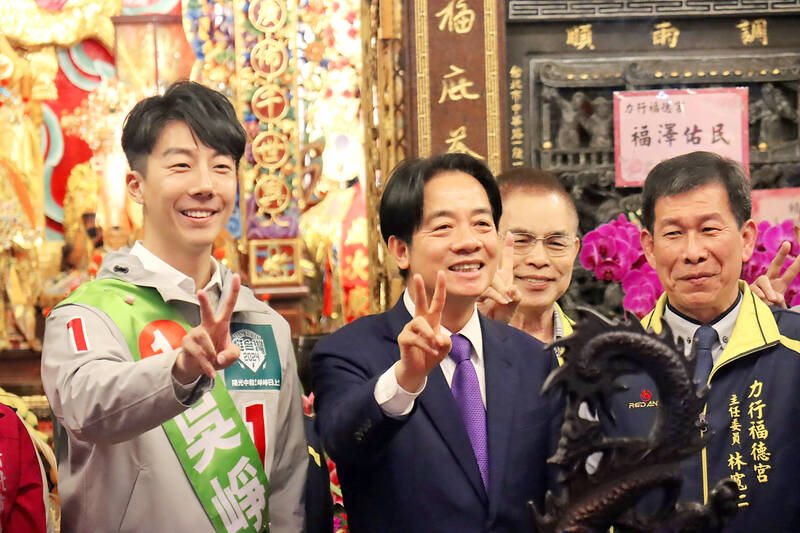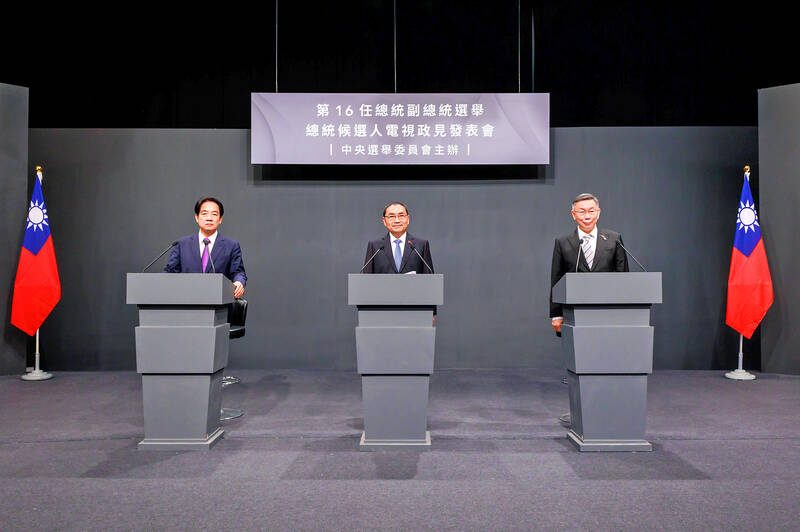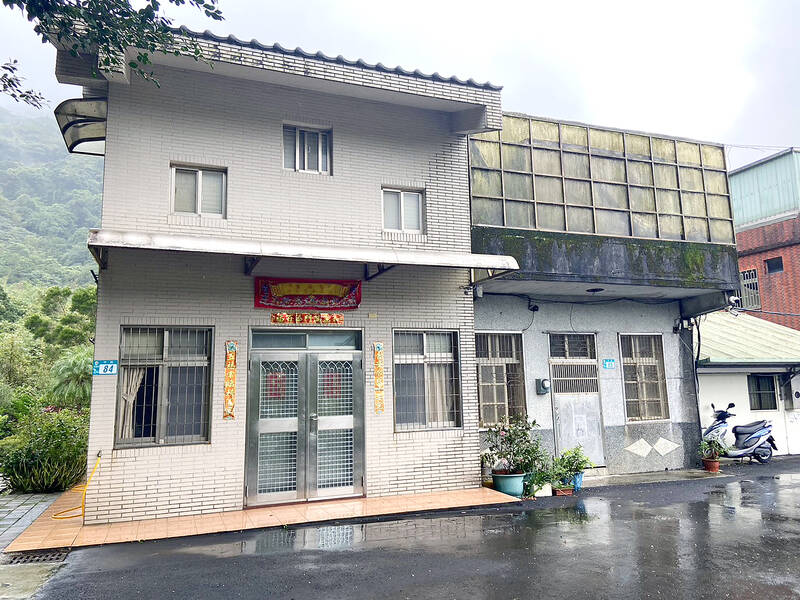In the last couple of weeks, the Chinese Nationalist Party (KMT) and Taiwan People’s Party (TPP) have been attacking Democratic Progressive Party (DPP) presidential hopeful William Lai (賴清德) over his allegedly illegal family house. Both parties have accused Lai’s family of illegally expanding the property and contended that the building, located in what is now New Taipei City, should have been torn down by the local government years ago. TPP legislator-at-large nominee Huang Kuo-chang (黃國昌), once a power in the New Power Party (NPP), has further accused Lai of not paying housing taxes on the property in Wanli District (萬里) for over two decades, saying that Lai must pay back taxes.
The faux dispute continued last week with the New Taipei City land office, which should be politically neutral, issuing a statement on Tuesday saying that Lai’s family home had been “constructed from ground level in 2003” and published aerial photographs it claimed to be evidence, according to this paper (“DPP, New Taipei City lock horns over house”, Dec 26, 2023). The Lai family’s household registration, however, shows that the house has been there since 1958. That means that it is not subject to land laws applying to structures erected after 1981.
The particulars of this issue are unimportant, since in elections accusations of illegal structures are common. Most people with the money to run in an election own a house, and many buildings can be plausibly shown to be in violation of some law or other. A glance at the rooftops of any city will reveal that most homes have illegal floors, reconstructed balconies and other illegalities.

Photo: Weng Yu-huang, Taipei Times
Ko Wen-je (柯文哲), the TPP candidate, was recently revealed to own (along with other doctors) a plot of farmland that had been repaved as a bus parking lot. Ko and the other co-owners allegedly collected fees for parking, but had no permits to do so.
THIN GRUEL
The real issue is why the pro-China parties reached for this attack, so obviously thin gruel with its seemingly high probability of backfiring, in the first place. Before the KMT brought this issue up, most voters probably did not know that Lai’s father and grandfather were both coal miners in the mines of northern Taiwan, a brutal occupation that yielded only grinding poverty and a short lifespan. Lai’s father died when he was a toddler. Lai has brought himself up from less than nothing.

Photo courtesy of the CEC
Now the KMT has brought these facts to the attention of voters. The KMT has also reminded voters that Lai is not alone. There are hundreds of such structures in New Taipei City left over from that era that have problems with registrations, titles and permits. The history is sad: the miners had no rights to the land the mines were built on, and were left with little but lung diseases.
In sum, the KMT has humanized, even beatified Lai by giving him a Taiwan-centered history with longstanding, widely-encountered, and well understood problems, presenting Lai as a highly educated, successful, hardworking Taiwanese who rose from a background of desperate poverty, like tens of thousands of his fellow Taiwanese.
You know, an uppity Taiwanese.

Photo: Lu Heien-hsiu, Taipei Times
This move isn’t about attacking Lai. KMT internal polls have to be showing the same thing that the recent public polls are showing: Lai is maintaining 7-9 percent lead over Hou, and likely slowly pulling away from him.
The KMT knows it probably can’t win. But it can consolidate its base. This attack is one with its moves to surround Hou with far-right Mainlanders like his vice presidential candidate Jaw Shaw-kong (趙少康) and the proposed speaker of the legislature Han Kuo-yu (韓國瑜). It signals to the far right (read: deep blue) KMT base that Lai has stepped beyond the bounds of his “proper” social class, one of obvious inferiority to the Mainlanders, who see themselves as superior to “low class” Taiwanese who have “market names” and who have hijacked their Republic of China. Time to circle the wagons against the barbarians, and vote KMT!
Much like former president Chen Shui-bian (陳水扁). In the run-up to the 2000 election, I asked people why they supported ex-KMTer and Mainlander James Soong (宋楚瑜), and was repeatedly told “because he is a gentleman,” by which they meant, he was the right (superior) social class (people were more open about this particular form of social class contempt in those days).
In addition to pressing social class buttons, the other trigger is fear. An excellent piece in the Liberty Times (the Taipei Times sister newspaper) contrasted the experience of the miners with the experience of the Mainlanders who lived in military dependents villages, making an important connection that is obvious to Mainlanders. These villages were often built on land seized from the Taiwanese (or unacknowledged plains indigenous land, the KMT government having eliminated plains indigenous as a census category, claiming they no longer existed).
The military dependents, largely those who escaped to Taiwan during the Chinese Civil War, were well taken care of by the government, not only receiving easy payment deals for the houses and land, but jobs in state-owned businesses. When the old villages were converted into modern apartment housing, they received homes in the buildings, in many cases now worth millions.
STOLEN WEALTH
The Mainlanders as a group sit on a vast pool of capital asset wealth that was extracted from the Taiwanese. This group knows perfectly well that it is a colonial ruling class that benefited from Taiwan in the same way that working class British people made out like bandits if they went to India. Like all colonial ruling classes, its one great fear is revolt. For this group, hurling a land issue at Lai is highlighting the vulnerability of their own assets. What if Lai wants revenge by taking those assets back? Close ranks, and vote to stop that!
This is simply an updated version of the attacks on Chen Shui-bian, both before the election and for years afterwards. In fact in the waning years of the Chen administration a controversial amendment to the Statute Governing Reconstruction of Old Military Dependents’ Villages (國軍老舊眷村改建條例) called for pouring out hundreds of millions in taxpayer dollars to house old military dependents, even though many of them already had their own residences.
That amendment, and the current attacks on Lai, should be a reminder of a fact often overlooked because it is refracted through the lens of China and not the KMT’s domestic colonial rule: hidden in the “blue-green divide” is a bitter struggle for the island’s resources. In Taiwan, questions of identity are questions of money and asset flows.
Notes from Central Taiwan is a column written by long-term resident Michael Turton, who provides incisive commentary informed by three decades of living in and writing about his adoptive country. The views expressed here are his own.

Not long into Mistress Dispeller, a quietly jaw-dropping new documentary from director Elizabeth Lo, the film’s eponymous character lays out her thesis for ridding marriages of troublesome extra lovers. “When someone becomes a mistress,” she says, “it’s because they feel they don’t deserve complete love. She’s the one who needs our help the most.” Wang Zhenxi, a mistress dispeller based in north-central China’s Henan province, is one of a growing number of self-styled professionals who earn a living by intervening in people’s marriages — to “dispel” them of intruders. “I was looking for a love story set in China,” says Lo,

It was on his honeymoon in Kuala Lumpur, looking out of his hotel window at the silvery points of the world’s tallest twin skyscrapers, that Frank decided it was time to become taller. He had recently confessed to his new wife how much his height had bothered him since he was a teenager. As a man dedicated to self-improvement, Frank wanted to take action. He picked up the phone, called a clinic in Turkey that specializes in leg lengthening surgery — and made a booking. “I had a lot of second thoughts — at the end of the day, someone’s going

In the next few months tough decisions will need to be made by the Taiwan People’s Party (TPP) and their pan-blue allies in the Chinese Nationalist Party (KMT). It will reveal just how real their alliance is with actual power at stake. Party founder Ko Wen-je (柯文哲) faced these tough questions, which we explored in part one of this series, “Ko Wen-je, the KMT’s prickly ally,” (Aug. 16, page 12). Ko was open to cooperation, but on his terms. He openly fretted about being “swallowed up” by the KMT, and was keenly aware of the experience of the People’s First Party

Standing on top of a small mountain, Kim Seung-ho gazes out over an expanse of paddy fields glowing in their autumn gold, the ripening grains swaying gently in the wind. In the distance, North Korea stretches beyond the horizon. “It’s so peaceful,” says the director of the DMZ Ecology Research Institute. “Over there, it used to be an artillery range, but since they stopped firing, the nature has become so beautiful.” The land before him is the demilitarized zone, or DMZ, a strip of land that runs across the Korean peninsula, dividing North and South Korea roughly along the 38th parallel north. This